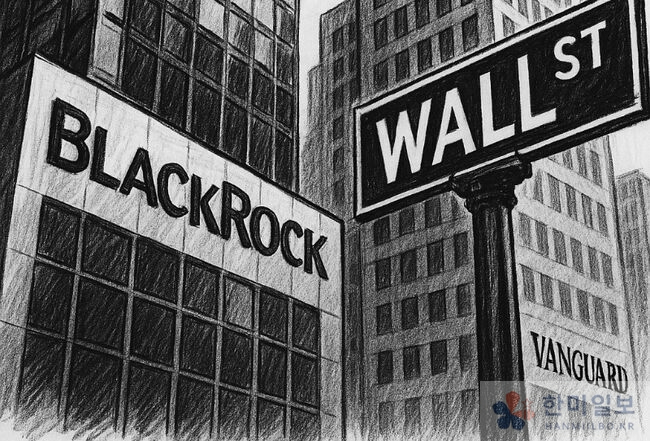 MAGA’s slogan collides with Wall Street’s greed. BlackRock and Vanguard are regarded as the control towers of ESG. Hanmiilbo graphic.
MAGA’s slogan collides with Wall Street’s greed. BlackRock and Vanguard are regarded as the control towers of ESG. Hanmiilbo graphic.
Series Index
① ESG… The Financial Weapon of Globalism
② The Challenge of MAGA… A War of Norms, Not Tariffs
③ Political Correctness and Elections… How Democracy Was Tamed
④ Election Controversies… Globalism and the Fracture of Democracy
⑤ Korea’s Choice… The Moment of Decision Between Two Systems
The three letters ESG have become an unavoidable rule in today’s global capital markets. Standing for Environmental, Social, and Governance, the concept projects an image of corporations and financiers awakening to ethical responsibility. Yet its origins show that it was not a moral awakening, but rather a new system of regulation created by international financial elites. Today, ESG has fused with globalism and political correctness, becoming a weapon that shapes the destiny of nations and corporations alike.
The roots of ESG go back to socially responsible investment (SRI) and environmental movements in the late 20th century. But the decisive turning point was the 2004 UN Global Compact report Who Cares Wins. Major banks such as Goldman Sachs, Deutsche Bank, and Credit Suisse participated in drafting the report, which officially coined the term ESG. By 2006, the UN had launched the Principles for Responsible Investment (PRI), bringing in the world’s largest pension funds and investment banks. From that moment, ESG moved beyond a voluntary corporate guideline and transformed into a global rule controlling capital markets.
At first glance, ESG seems benign. Few would oppose the idea of curbing environmental destruction, respecting minority rights, or making corporate governance transparent. But the rule is far from neutral. Who decides what industries are “green,” what social values deserve priority, or what governance model is “ideal”? Those powers are concentrated in the hands of international organizations, global rating agencies, and mega-asset managers. Giants such as BlackRock and Vanguard assign ESG scores and allocate capital, effectively holding the power of life and death over companies worldwide.
Here political correctness steps in. The “S” in ESG extends far beyond workplace safety to include diversity, gender equality, and minority inclusion. What began as values of social activism have been institutionalized within ESG, creating a structure where “political correctness” is enforced through the marketplace. Companies that adhere to traditional cultural values risk being branded as “backward” or “uninvestable.” Thus, ESG has expanded from economics into political and cultural regulation.
Globalism found its perfect partner in ESG. Under the banner of universal values, governments were compelled to prioritize compliance with ESG standards over national industrial policy. The EU has bound corporations and states with mechanisms like the Carbon Border Adjustment Mechanism (CBAM) and the Corporate Sustainability Reporting Directive (CSRD). In the U.S., Democratic administrations have used SEC disclosure rules to regulate corporations. In this way, regardless of what a nation’s democracy decides, those outside global norms risk being shut out of markets.
The rules are not applied evenly. Western corporations bear heavy costs to comply with ESG, weakening their competitiveness. Meanwhile, China has embraced ESG only rhetorically while using cheap energy and state subsidies to dominate markets. Ironically, globalism’s so-called “universal norms” become shackles on advanced economies while strengthening Chinese cost advantages. ESG thus functions less as a neutral standard than as a weapon favoring specific powers.
Korea is no exception. The Democratic Party government embraced the “Green New Deal” and ESG-driven governance, but on the ground, companies face overlapping regulations and mounting costs. Core industries such as steel, petrochemicals, and batteries must simultaneously contend with EU’s CBAM, America’s IRA, and China’s price offensive. ESG is no longer just a management issue—it has become a political rule that dictates industrial strategy and national autonomy.
In sum, ESG is a financial weapon masked with the rhetoric of environment, human rights, and diversity. Its wielders are international financial elites who combine globalism with political correctness to discipline nations and corporations. ESG is no longer a trend in investment—it is a mechanism that restricts political choices themselves. Resistance to this structure is precisely what gave rise to Trump’s MAGA movement.
Key Terms
ESG (Environmental, Social, Governance): A set of principles for corporate activity and investment decisions considering environmental, social, and governance factors. First formalized in a 2004 UN report.
UN PRI (Principles for Responsible Investment): Launched in 2006 under the UN, now a global network of pension funds and asset managers promoting ESG.
CBAM (Carbon Border Adjustment Mechanism): An EU system imposing costs on imports of carbon-intensive products such as steel and cement.
CSRD (Corporate Sustainability Reporting Directive): An EU directive requiring large companies to disclose ESG-related data.
Political Correctness (PC): A social and cultural norm emphasizing diversity, minority rights, and gender equality.
Globalism: A policy and ideology prioritizing international institutions and borderless markets over national sovereignty.
BlackRock: The world’s largest asset manager and a key player in promoting ESG standards and disclosure rules.
#ESG #MAGA #Globalism #PoliticalCorrectness #FinancialElites #ElectionIntegrity #CarbonRegulation #KoreasChoice #InternationalPolitics #Hanmiilbo #blackrock